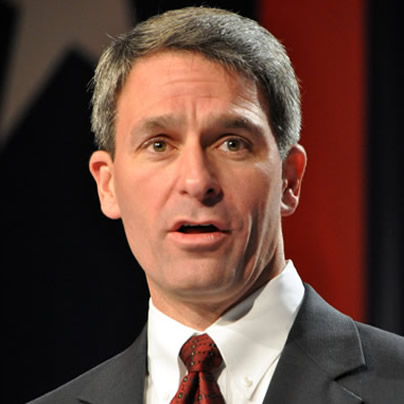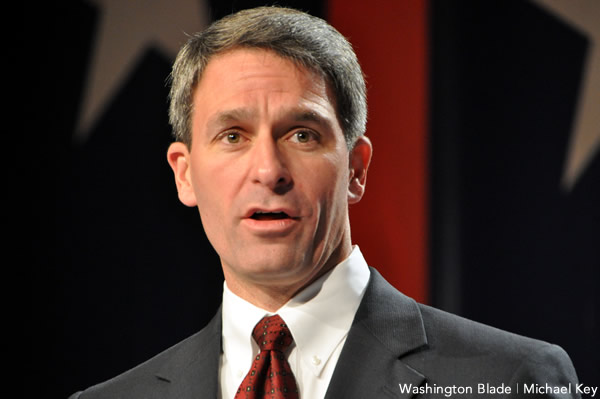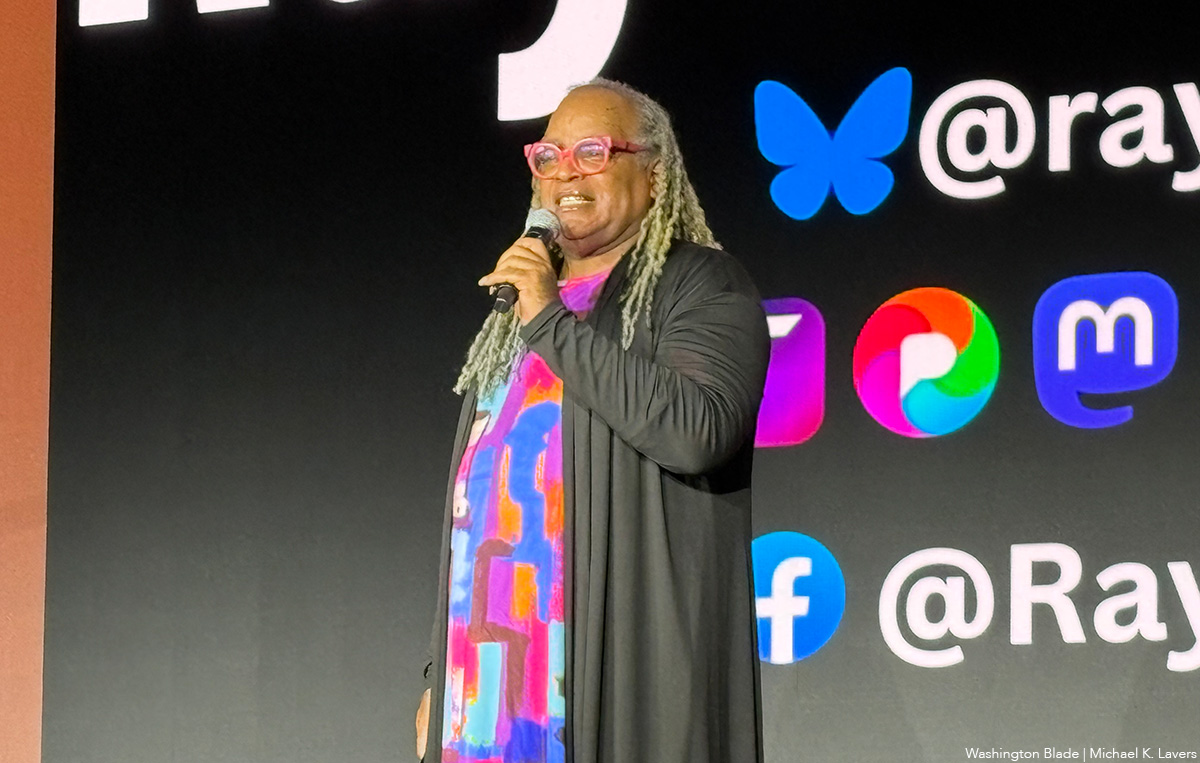Local
Supreme Court denies Cuccinelli appeal of Va. sodomy law ruling
Action upholds lower court ruling striking down law


The high court declined to hear a case brought by Virginia Attorney General Ken Cuccinelli related to the commonwealth’s sodomy law. (Washington Blade file photo by Michael Key)
The U.S. Supreme Court on Monday denied a petition by Virginia Attorney General Ken Cuccinelli seeking to appeal a lower court ruling declaring the state’s Crimes Against Nature or sodomy law unconstitutional.
By refusing to hear the case, the high court allowed a decision in March striking down the law by the Fourth Circuit U.S. Court of Appeals in Richmond to stand, ending efforts by Cuccinelli and other officials to get the state’s ban on oral and anal sex between consenting adults reinstated.
“Under any circumstances this is definitely a victory and it’s a good one,” said Claire Gastanaga, executive director of the ACLU of Virginia. “It puts to rest this idea that somehow you can have a statute that’s found unconstitutional but you can still be prosecuted under it.”
Gastanaga was referring to the Supreme Court’s landmark 2003 decision of Lawrence v. Texas that overturned state sodomy laws. A three-judge panel of the Fourth Circuit Court of Appeals cited the Lawrence decision as the basis for its decision in March to overturn Virginia’s Crimes Against Nature statute, saying it could no longer be enforced under any circumstances.
Cuccinelli has contended that the Lawrence decision doesn’t apply to cases involving sex between adults and minors. As a candidate for governor, Cuccinelli launched a special campaign website earlier this year claiming removal of the sodomy law would prevent law enforcement officials from prosecuting “child predators.”
LGBT rights attorneys have disputed that claim, saying existing state laws enable police and prosecutors to arrest and prosecute anyone who sexually abuses a minor.
The Fourth Circuit appeals court decision struck down a felony conviction by a judge in the city of Colonial Heights, Va., of a 47-year-old man for soliciting oral sex from a 17-year-old woman. Although no sex took place, the defendant, William Scott MacDonald, had been charged with soliciting someone to commit a sexual act that his attorneys argued was no longer illegal under the Lawrence decision.
In its 2-1 ruling, the appeals court panel declared that the Lawrence decision invalidated the Virginia Crimes Against Nature law as “facially” unconstitutional, preventing it from being enforced, even in cases of consensual sodomy between an adult and a minor if the minor is between the ages of 15 and 18. The judges noted that the age of sexual consent in Virginia is 15.
Cuccinelli’s office issued a statement on Monday saying the elimination of the sodomy law “puts tools prosecutors need to protect children in jeopardy.”
According to the statement, Cuccinelli’s efforts to keep the law on the books “was never about sexual orientation or private acts between consenting adults” but instead was about enabling law enforcement officials to “prosecute child predators.”
Attorneys familiar with the case — including prosecutors in Arlington and Alexandria — have said existing state laws give law enforcement officials the ability to prosecute all cases of forcible or coerced sex between an adult and a minor as a felony. They say that heterosexual intercourse between a minor within the age range of 15 through 17 and an adult can still be prosecuted as a misdemeanor. But with the elimination of the state sodomy law, consenting oral or anal sex among minors — gay or straight — between age 15 and 17 and an adult is fully legal and can’t be prosecuted until or unless the legislature changes the law.
Gastanaga and others familiar with Cuccinelli’s concerns have called on the Virginia General Assembly to revise the existing laws addressing the age of consent or sex with minors in a way that doesn’t violate the Constitution as spelled out in the Lawrence decision.
“That means you’ve got to do the hard work of getting together with the Commonwealth’s Attorneys and public defenders and other criminal defense lawyers and legislators and people like us and try to work out something that does address what you want to address, which is sexual activity that is not constitutionally protected,” Gastanaga said.
James Parrish, executive director of the statewide LGBT group Equality Virginia, said his organization would not oppose legislation that reforms existing laws to address potential problems resulting from the striking down of the sodomy law.
“This is something the Supreme Court decided now more than 10 years ago,” Parrish said. “We understand that the attorney general and others have some concerns of how the sodomy law was intertwined with other laws. They have had 10 years to make those laws more clear and we would hope they would work with the General Assembly to address these concerns” in a way that doesn’t violate the Lawrence decision’s protections pertaining to consenting adults, he said.
Although Cuccinelli criticized his Democratic opponent, businessman Terry McAuliffe, for expressing support for overturning the Virginia sodomy law, McAuliffe was leading Cuccinelli by a 42 to 37 percent margin in one of the most recent public opinion polls conducted by Virginia’s Hampton University.
Josh Schwerin, McAuliffe’s press secretary, said Cuccinelli demonstrated “an extreme agenda and uncompromising approach” by refusing in the past to support legislation to update Virginia’s laws to conform to the Supreme Court ruling on sodomy.
“Everyone supports strong laws to protect children and, like most Virginians, Terry believes our law should be updated to both conform with court rulings and allow prosecution of predators,” Schwerin said. “As he admitted as recently as 2009, Ken Cuccinelli is one of the only elected officials in America who believes that being gay should result in criminal prosecution and jail time,” he said.
Under the Supreme Court’s rules, at least four of the court’s nine justices must vote to hear a case in order for the court to consider a case on its merits. The court never discloses how individual justices vote or what the vote count was when it decides whether or not to take a case.
However, in August Supreme Court Chief Justice John Roberts issued a ruling denying a separate petition by Cuccinelli asking the court to put a stay on the Fourth Circuit Court of Appeals ruling striking down the Virginia sodomy law until the Supreme Court decided whether or not to take the case. Roberts did not issue an explanation for denying Cuccinelli’s request for a stay.
Virginia
McPike wins special election for Va. House of Delegates
Gay Alexandria City Council member becomes 8th LGBTQ member of legislature

Gay Alexandria City Council member Kirk McPike emerged as the decisive winner in a Feb. 10 special election for a seat in the Virginia House of Delegates representing Alexandria.
McPike, a Democrat, received 81.5 percent of the vote in his race against Republican Mason Butler, according to the local publication ALX Now.
He first won election to the Alexandria Council in 2021. He will be filling the House of Delegates seat being vacated by Del. Elizabeth Bennett-Parker (D-Alexandria), who won in another Feb. 10 special election for the Virginia State Senate seat being vacated by gay Sen. Adam Ebbin (D-Alexandria).
Ebbin is resigning from his Senate next week to take a position with Virginia Gov. Abigail Spanberger’s administration.
Upon taking his 5th District seat in the House of Delegate, McPike will become the eighth out LGBTQ member of the Virginia General Assembly. Among those he will be joining is Sen. Danica Roem (D-Manassas), who became the Virginia Legislature’s first transgender member when she won election to the House of Delegates in 2017 before being elected to the Senate in 2023.
“I look forward to continuing to work to address our housing crisis, the challenge of climate change, and the damaging impacts of the Trump administration on the immigrant families, LGBTQ+ Virginians, and federal employees who call Alexandria home,” McPike said in a statement after winning the Democratic nomination for the seat in a special primary held on Jan. 20.
McPike, a longtime LGBTQ rights advocate, has served for the past 13 years as chief of staff for gay U.S. Rep. Mark Takano (D-Calif.) and has remained in that position during his tenure on the Alexandria Council. He said he will resign from that position before taking office in the House of Delegates.
Local
Local LGBTQ groups, activists to commemorate Black History Month
Rayceen Pendarvis to moderate Dupont Underground panel on Sunday

LGBTQ groups in D.C. and elsewhere plan to use Black History Month as an opportunity to commemorate and celebrate Black lives and experiences.
Team Rayceen Productions has no specific events planned, but co-founder Rayceen Pendarvis will attend many functions around D.C. this month.
Pendarvis, a longtime voice in the LGBTQ community in D.C. moderated a panel at Dupont Underground on Feb. 8. The event, “Every (Body) Wants to Be a Showgirl,” will feature art from Black burlesque artists from around the country. Pendarvis on Feb. 23 will attend the showing of multimedia play at the Lincoln Theatre that commemorates the life of James Baldwin.
Equality Virginia plans to prioritize Black voices through a weekly online series, and community-based story telling. The online digital series will center Black LGBTQ voices, specifically trailblazers and activists, and contemporary Black queer and transgender people.
Narissa Rahaman, Equality Virginia’s executive director, stressed the importance of the Black queer community to the overall Pride movement, and said “Equality Virginia is proud to center those voices in our work this month and beyond.”
The Capital Pride Alliance, which hosts Pride events in D.C., has an alliance with the Center for Black Equity, which brings Black Pride to D.C. over Memorial Day weekend. The National LGBTQ Task Force has no specific Black History Month events planned, but plans to participate in online collaborations.
Cathy Renna, the Task Force’s director of communications, told the Washington Blade the organization remains committed to uplifting Black voices. “Our priority is keeping this at the forefront everyday,” she said.
The D.C. LGBTQ+ Community Center is also hosting a series of Black History Month events.
The D.C. Public Library earlier this year launched “Freedom and Resistance,” an exhibition that celebrates Black History Month and Martin Luther King Jr. It will remain on display until the middle of March at the Martin Luther King Jr. Memorial Library at 901 G St., N.W.
District of Columbia
U.S. Attorney’s Office drops hate crime charge in anti-gay assault
Case remains under investigation and ‘further charges’ could come

D.C. police announced on Feb. 9 that they had arrested two days earlier on Feb. 7 a Germantown, Md., man on a charge of simple assault with a hate crime designation after the man allegedly assaulted a gay man at 14th and Q Streets, N.W., while using “homophobic slurs.”
But D.C. Superior Court records show that prosecutors with the Office of the U.S. Attorney for D.C., which prosecutes D.C. violent crime cases, charged the arrested man only with simple assault without a hate crime designation.
In response to a request by the Washington Blade for the reason why the hate crime designation was dropped, a spokesperson for the U.S. Attorney’s office provided this response: “We continue to investigate this matter and make no mistake: should the evidence call for further charges, we will not hesitate to charge them.”
In a statement announcing the arrest in this case, D.C. police stated, “On Saturday, February 7, 2026, at approximately 7:45 p.m. the victim and suspect were in the 1500 block of 14th Street, Northwest. The suspect requested a ‘high five’ from the victim. The victim declined and continued walking,” the statement says.
“The suspect assaulted the victim and used homophobic slurs,” the police statement continues. “The suspect was apprehended by responding officers.”
It adds that 26-year-old Dean Edmundson of Germantown, Md. “was arrested and charged with Simple Assault (Hate/Bias).” The statement also adds, “A designation as a hate crime by MPD does not mean that prosecutors will prosecute it as a hate crime.”
Under D.C.’s Bias Related Crime Act of 1989, penalties for crimes motivated by prejudice against individuals based on race, religion, sexual orientation, gender identity, disability, and homelessness can be enhanced by a court upon conviction by one and a half times greater than the penalty of the underlying crime.
Prosecutors in the past both in D.C. and other states have said they sometimes decide not to include a hate crime designation in assault cases if they don’t think the evidence is sufficient to obtain a conviction by a jury. In some instances, prosecutors have said they were concerned that a skeptical jury might decide to find a defendant not guilty of the underlying assault charge if they did not believe a motive of hate was involved.
A more detailed arrest affidavit filed by D.C. police in Superior Court appears to support the charge of a hate crime designation.
“The victim stated that they refused to High-Five Defendant Edmondson, which, upon that happening, Defendant Edmondson started walking behind both the victim and witness, calling the victim, “bald, ugly, and gay,” the arrest affidavit states.
“The victim stated that upon being called that, Defendant Edmundson pushed the victim with both hands, shoving them, causing the victim to feel the force of the push,” the affidavit continues. “The victim stated that they felt offended and that they were also gay,” it says.
-

 Virginia2 days ago
Virginia2 days agoMcPike wins special election for Va. House of Delegates
-

 New York4 days ago
New York4 days agoPride flag removed from Stonewall Monument as Trump targets LGBTQ landmarks
-

 Florida4 days ago
Florida4 days agoDisney’s Gay Days ‘has not been canceled’ despite political challenges
-

 Philippines4 days ago
Philippines4 days agoPhilippines Supreme Court rules same-sex couples can co-own property



















